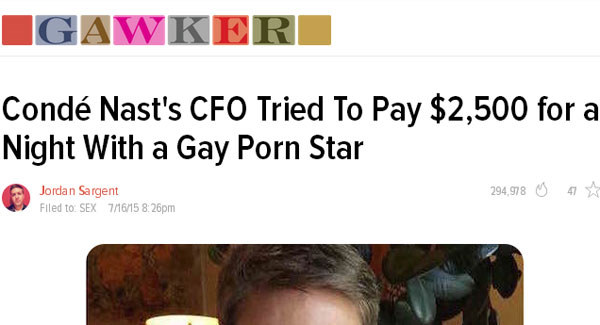
Announcement From GAWKER.com: Tommy Craggs, the executive editor of Gawker Media, and Max Read, the editor-in-chief of Gawker.com, are resigning from the company. In letters sent today, Craggs and Read informed staff members that the managing partnership’s vote to remove a controversial post about the CFO of Condé Nast—a unprecedented act endorsed by zero editorial employees—represented an indefensible breach of the notoriously strong firewall between Gawker’s business interests and the independence of its editorial staff. Under those conditions, Craggs and Read wrote, they could not possibly guarantee Gawker’s editorial integrity.
On July 17 , Craggs informed the managing partnership that, “If we decide to pull the post, I think I have to quit.” Still, as we reported last week, four partners—CEO Nick Denton; chief operating officer Scott Kidder; chief strategy officer Erin Pettigrew; and Andrew Gorenstein, who serves as president of advertising and partnerships—voted to remove the post. When Craggs began informing others that he was indeed quitting, colleagues persuaded him to wait until Monday to officially make a decision. On Saturday, Read informed staffers that if Craggs quit, he would quit as well. Over the weekend, Denton and colleagues of Read and Craggs tried, and failed, to persuade them to stay.
Here is Craggs’ memo to the editorial staff of Gawker Media:
I want to give you some sense of what happened within Gawker Media on Friday, and what has happened since, as a means of explaining why I have to resign as executive editor.
On Friday, I told my fellow managing partners—Nick Denton, founder and CEO; Heather Dietrick, president; Andrew Gorenstein, president of advertising and partnerships; Scott Kidder, chief operating officer; and Erin Pettigrew, chief strategy officer—I would have to resign if they voted to remove a story I’d edited and approved. The article, about the Condé Nast CFO’s futile effort to secure a remote assignation with a pricey escort, had become radioactive. Advertisers such as Discover and BFGoodrich were either putting holds on their campaigns or pulling out entirely.
(This isn’t the place to debate the merits of that story, other than to say that I stand by the post. Whatever faults it might have belong to me, and all the public opprobrium being directed at Jordan Sargent, a terrific reporter, should come my way instead.)
That there would even be a vote on this was a surprise to me. Until Friday, the partnership had operated according to a loose consensus. Nothing had ever come to a formal vote, and the only time anyone had even hinted that the partners might intrude on a departmental prerogative was when Andrew Gorenstein wondered openly in a partnership meeting why Sam Biddle hadn’t been fired.
I’d learned of the vote via gchat with Heather Dietrick, who throughout the day was my only conduit to the partners, Nick Denton included. The only reply to my pleading emails about yanking the story was a sneering note from Gorenstein. That is to say, none of the partners in a company that prides itself on its frankness had the decency or intellectual wherewithal to make the case to the executive editor of Gawker Media for undermining (if not immolating) his job, forsaking Gawker’s too-often-stated, too-little-tested principles, and doing the most extreme and self-destructive thing a shop like ours could ever do.
Continue Reading By Clicking Here.

